Nigel Farage: The story of 'Mr Brexit'
- Published
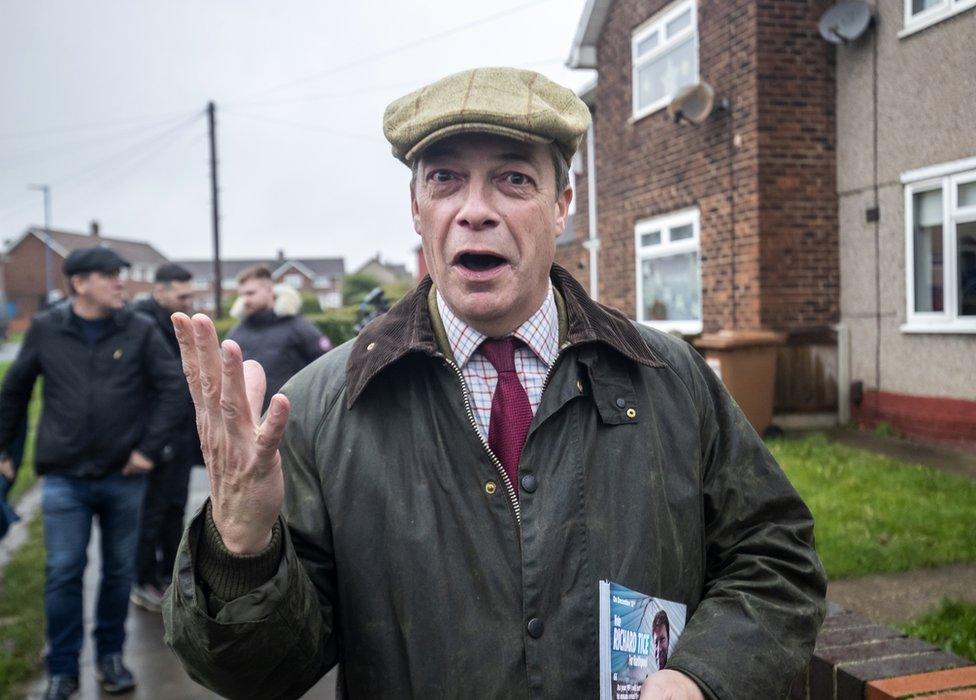
Nigel Farage on the campaign trail in Hartlepool, County Durham
He's a pro. To watch Nigel Farage in front of a crowd of believers is to witness a well-honed performance.
He's in uniform - tweed jacket, tan corduroy trousers, check shirt, knitted red tie, every garment a cultural signal. He jokes with the crowd, and they laugh happily. He invokes the enemy, successively the Lib Dems (hiss), Diane Abbott (laughter), Theresa May (groan) Jeremy Corbyn (boo!). The crowd enjoys it so much, he warns he may have to close the bar, heh-heh-ing to himself as he segues into a pledge of a better future for the fishing industry (this is Grimsby in mid-November, and Farage is on a campaign visit).
By the time the Brexit Party leader finishes, with a flailing attack on a corrupt, out-of-date political system, the audience is eating out of his hand.
A few days later, in front of a more hostile BBC Question Time audience, he's equally practised. He's done that side of electioneering plenty of times - and maybe the gestures are a bit choppier and the posture less relaxed, but he has been beleaguered in a studio before.
No, he's not a racist, and the Brexit Party has an impressively diverse team of candidates, he says. No, he doesn't want to privatise the NHS - but he would like to see more better-off people taking out private health insurance to cut the burden on taxpayers, and he is unimpressed by concerns that this might undermine the principle of a universal service. He wants to limit immigration because the population is rising too fast. Yes, the future outside the EU is bright. Those who expected a cartoon ogre may not be converted, but he's not quite what they expected.
The populist
Nigel Farage is a political force in his own right - a creator of parties, not a cog within them. That rare sub-species of politician seen by voters as distinctive. He took UKIP - the party he led three times over the course of 20 years, but left last year - from the political fringe to centre stage by stitching together a coalition of angry voters from across normal party lines.
In the process, he cornered David Cameron into promising the 2016 referendum. Just four months after he set up the Brexit Party, in February, it topped the polls in the 2019 European Parliamentary elections. This sent him back to Strasbourg for a fifth term as an MEP.
Brexit is his baby, if anyone is the father. And those who know Farage well understand his very human reluctance to see someone else dandling his baby on their knee. Part of his fury at the political establishment is because they always treated him with disdain, never acknowledged the scale of his achievement, and now the Conservative leadership want to co-opt it.
"You can make a convincing case that Nigel Farage is the most influential politician of the modern era," says Professor Matthew Goodwin, an academic who has studied the rise of UKIP. "He is responsible for mainstreaming Euroscepticism, bringing about the 2016 referendum and then delivering the vote for Brexit - and it's all the more impressive because he never reached the House of Commons. But maybe the price of that is that he has eroded British political culture and, for his critics, he has eroded consensus and civility."
So how did he do it? One close colleague says he has the strengths (and weaknesses) of his former career as a commodities trader. "He can spot openings in a market and take snap decisions, but he does not think strategically. He thinks and acts on the spur of the moment, as you would expect of a trader."
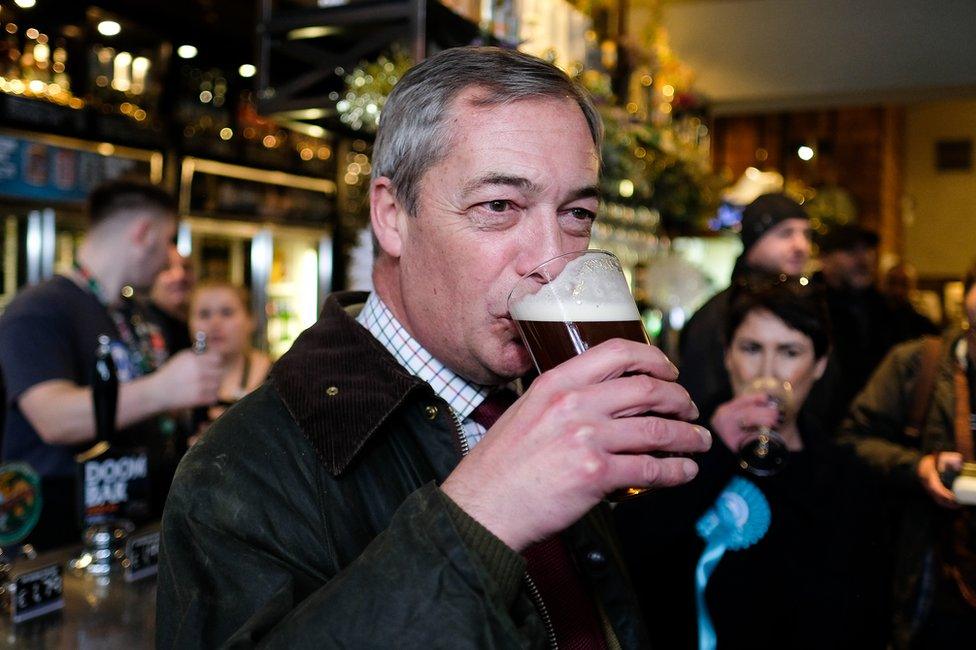
Nigel Farage drinks a pint as he visits Seaham, 2019
The gap in the market was for a radical-right populist in a politics dominated by Oxbridge-educated political professionals. Farage may be a prosperous, public-school educated MEP, who can look forward to a generous European Parliament pension after his 20 years in Strasbourg, but his language, style and character were shaped to appeal to working-class blokes and middle-class Eurosceptics.
His clothes, his talk about World War Two, the drinking and the laddish vibe all appeal to disaffected voters who don't connect with the elite of orthodox politics.

Nigel Farage timeline
Nigel Paul Farage was born 3 April 1964 in Kent. His stockbroker father was an alcoholic and walked out on the family when Nigel was five.
Farage attended fee-paying school Dulwich College in south-east London. At 18, he got a job as a trader in the City.
In his 20s Farage was run over by a car, sustaining major injuries. He married his nurse, Grainne Hayes, in 1986.
In 1992, he left the Conservatives in protest at the signing of the Maastricht Treaty. In 1993 he became a founding member of UKIP.
Farage was elected to the European Parliament in 1999. The same year he married his second wife Kirsten Mehr.
He resigned as UKIP leader to stand in the 2010 general election. On election day, Farage was seriously injured in a plane crash.
In 2014, Farage led UKIP to the largest share of the vote in the European election.
In 2019, Farage stood down from UKIP and launched the Brexit Party.

Douglas Carswell, a Conservative MP who defected to UKIP and the only person ever elected under a UKIP banner at a general election, says Farage is driven by his cause: "If you asked Cameron, or [Gordon] Brown, or Theresa May, why they wanted to be prime minister, they would give you vague answers about being good at the job. Nigel genuinely went into politics to get us out of the European Union. He's the only other leader in my lifetime, apart from Margaret Thatcher, who had a sense of mission which extended beyond themselves."
Farage was one of the first to realise that immigration was becoming a big issue, and he was one of the first to register the alienation in heartland Labour constituencies, where voters, perhaps, felt taken for granted by New Labour. He talks about how at the Oldham by-election of 2011 he walked through the streets and realised those votes were up for grabs, because, he thought, Labour was no longer connected to the concerns of their heartland voters.
It was Ed Miliband's decision not to commit to an EU referendum in 2015 that allowed UKIP to take four million votes, many from Labour, in crucial marginal seats. That tilted the electoral balance and allowed David Cameron to win in 2015, but only at the price of committing himself to a referendum.
Anti-establishment
The Brexit Party policy offer is centred on the idea of a challenge to the establishment, in what the party calls a contract with the people (an idea that echoes the Republican Contract with America which won them the 1994 congressional elections). The focus is on ditching what they see as unpopular ideas foisted on an unwilling population by an unaccountable elite.
Out goes HS2, the high-speed rail line, the apprenticeship levy and interest charges on student loans. In come promises of investment in left-behind Britain and policies to revive the High Street. There's a particular promise to regenerate fishing communities. Farage is often criticised for his poor attendance record as a member of the European Parliament fisheries committee - one out of a possible 42 meetings. He has said the committee is "pointless" and has no legislative or policy role.
There's a pledge to invest in strategic industries and create thousands of jobs in steel, railways and defence. Above all, there's a pledge to cap immigration at 50,000 people per year. It all speaks very directly at the areas where UKIP had its greatest electoral success - and where the Brexit Party hopes to inherit that vote.
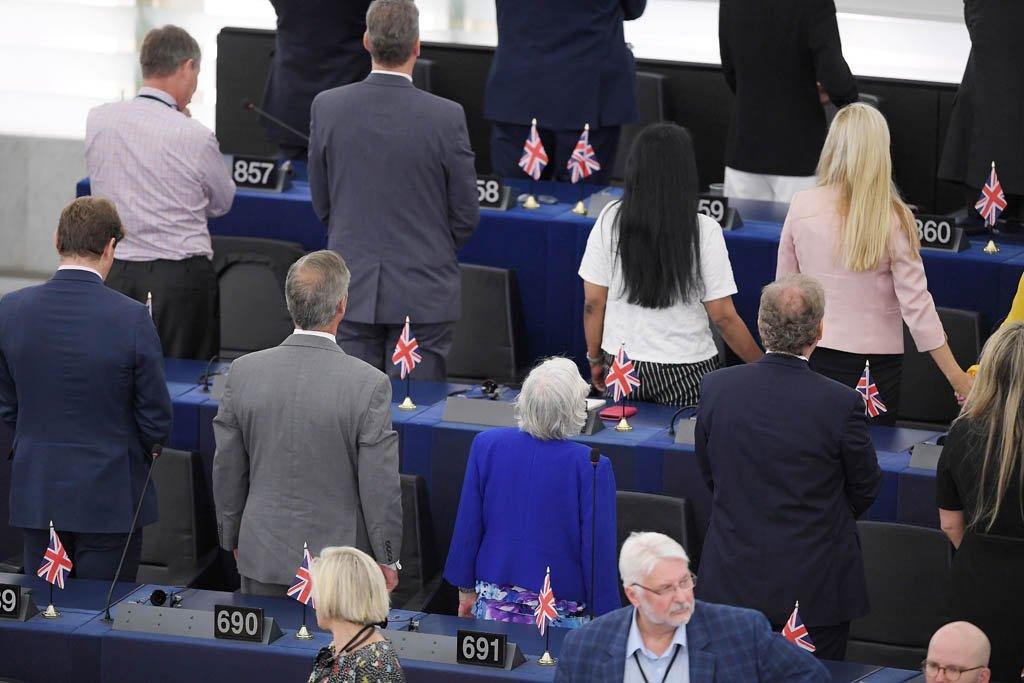
Brexit Party MEPs turn their backs during the European anthem ahead of the inaugural session at the European Parliament, 2019
The former Labour MP John Woodcock who saw UKIP take nearly 12% in his Leave-voting seat, Barrow-in-Furness, in 2015, said Labour campaigners found Farage a frustrating target. This was because lines of attack about his long and lucrative tenure in the European Parliament, and his privileged background, simply didn't stick to him. At the same time, he was perfectly capable of attacking others for being children of privilege, or for doing well out of a career in the EU.
"For all our efforts, he's still seen as someone who speaks truth to power and represents the basic anti-Europeanism that many traditional Labour voters feel," Woodcock - who recently announced he would be voting Conservative in the election - said. "Over the years he has managed to tap into concerns about immigration that are felt in places like Barrow, despite it being 99.4% white British."
Another ex-Labour MP for a Leave seat analyses his appeal: "White working-class voters are very angry, feel left behind by globalisation and think things are done to them with no-one asking - immigration, their way of life is threatened, and they're told it's redundant or even racist.
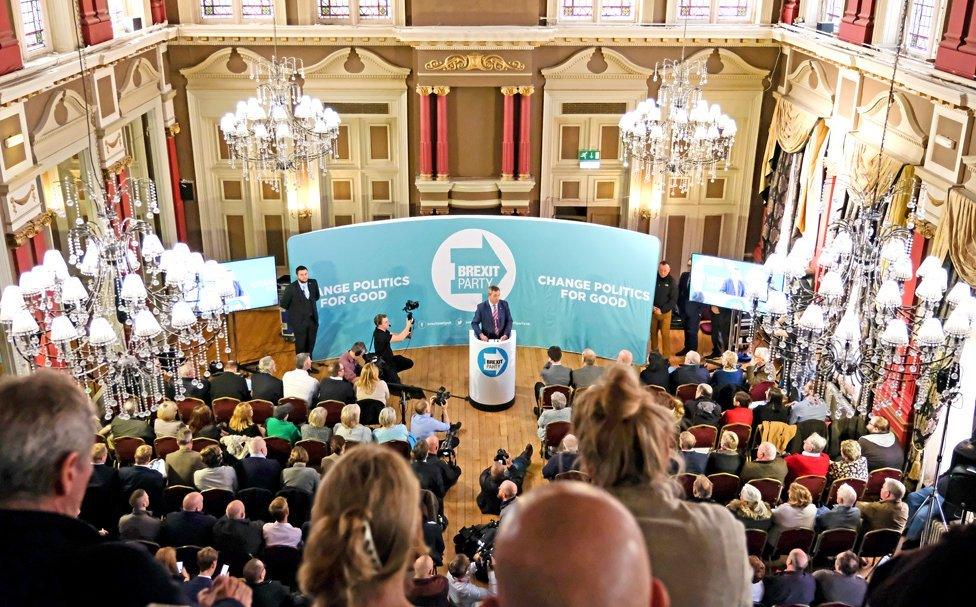
Nigel Farage speaking in Hartlepool, 2019
"Nigel Farage would not seem to be their natural spokesman, but he is - he's angry about the same things, he speaks to their patriotism, and he doesn't bang on about market forces, which matters because for a lot of people outside London, their experience of market forces is pretty negative. It's one reason why a lot of Conservative rhetoric doesn't impress them.
"He may be a public schoolboy, but they would send their children to a private school if they could afford it, and he also reaches a group of middle-class voters who are further to the right than many people realise."
And perhaps that sense of identification is why allegations against him don't seem to stick. And there have been plenty. Most spectacularly, he had to deny placing currency bets against sterling on the night of the EU referendum, after he wrongly conceded victory to the Remain camp.
His spokesperson insisted Farage "had no financial interest in currency movements on the night of Brexit", after claims that currency speculators used inaccurate early predictions of a Remain victory to profit by short-selling the pound. There have also been questions about who funds his personal expenses, and about his European Parliament expenses, but they seem to simply bounce off him. As well as being firmly denied, they don't matter to his core supporters.
The other side of that coin is a certain toxicity. In the past he has been accused of scare-mongering, xenophobia and, by some, inciting hatred. During the 2016 referendum, a great deal of the internal politics of the Leave campaign was about limiting Farage's visibility, so as not to frighten off swing voters.
Others argue that the Leave vote needed to mobilise both undecided voters and Farage supporters to succeed. If his voters had stayed at home, the Leave vote would not have been delivered - so perhaps there were some advantages in there being two campaigns, speaking to different constituencies, with different voices.
Entourage
One of Farage's quirks is his reliance on a cadre of highly committed activists, usually younger men like press officer Dan Jukes, or Chris Bruni-Lowe, the former UKIP campaign director who holds the same position in the Brexit Party. In small-party politics, that mattered because he didn't have a vast structure to call on. And he frequently leant on a chief wingman, successively party stalwart Andy Reid, then the self-styled "Bad Boy of Brexit" Arron Banks, and now the property developer and millionaire, Richard Tice. They're not underlings, they're people who he looks up to, and whose advice he listens to.
Banks helped bankroll Farage to the tune of £450,000 in the year after the Brexit referendum - paying for his London home, his car and trips to the US to meet Donald Trump - saying it was an "honour to help".
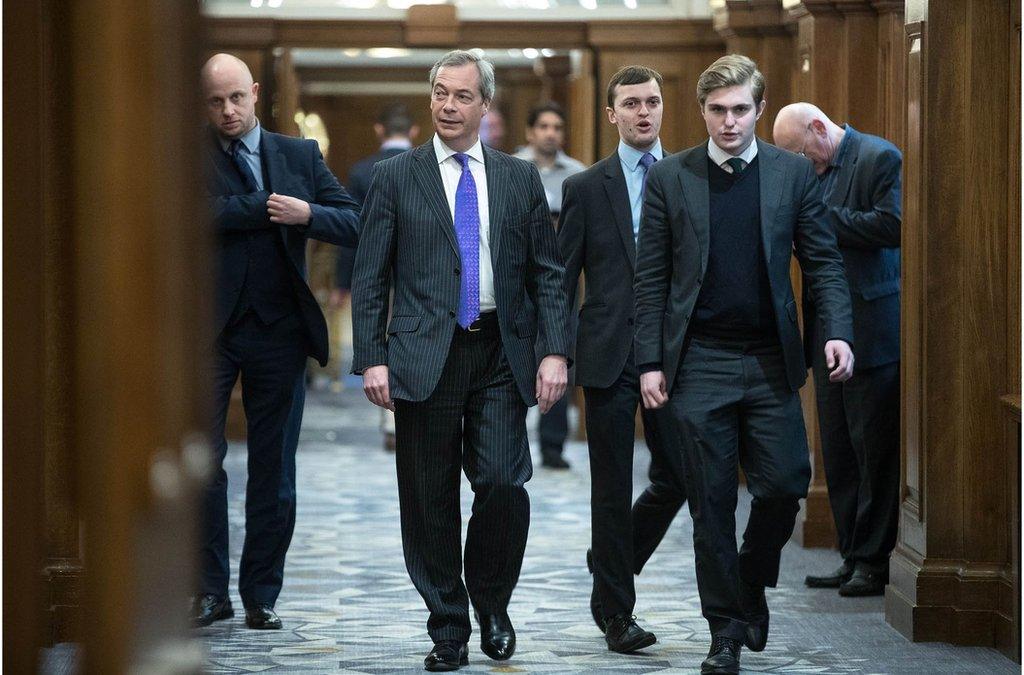
Nigel Farage and Dan Jukes (right), London, 2017
The quality of Farage's output varies with the quality of his wingmen. His tactical errors often stemmed from his taking bad advice from the wingman of the day - in particular, colleagues point to his flirtation with Steve Bannon, the guru of the American populist right, who managed Trump's presidential campaign.
That connection made Farage the first British politician to meet the then President-elect Trump, who suggested he should become the ambassador to Washington, and later urged the Conservatives to strike an election pact with the Brexit Party. Farage, for his part, suggested that Trump's peace initiative to North Korea merited a Nobel Peace Prize.

Leader profiles

Even after Bannon left the White House, Farage remained in contact with the president - one associate suspects they exchange direct messages via Twitter. But the influence of Bannon, critics say, was behind Farage's remark about Aids-infected immigrants in a televised election debate in 2015. He said Britain should not be spending money on health tourism, adding: "You can come into Britain from anywhere in the world and get diagnosed with HIV, and get the retro-viral drugs that cost up to £25,000 per year per patient. What we need to do is to put the NHS there for British people and families, who in many cases have paid into the system for decades."
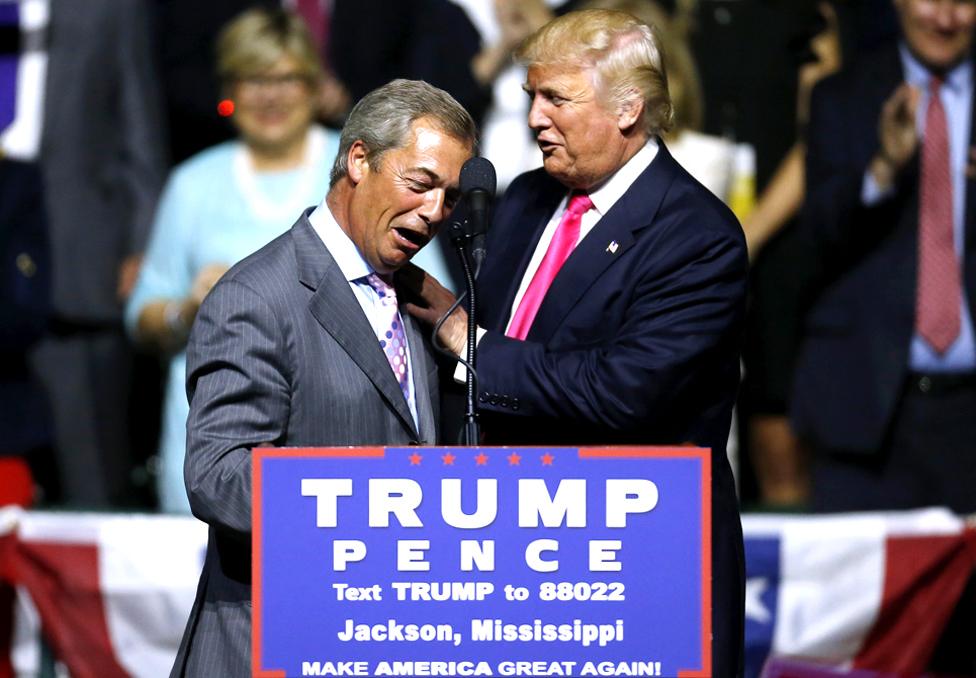
Donald Trump greets Nigel Farage at the Mississippi Coliseum, Jackson, 2016
UKIP hit the big time when it topped the poll in the 2014 elections to the European Parliament. That attracted serious talent and serious money to the party - but it also exposed a major Farage flaw. He could sense on instinct when public opinion was moving, but he struggled to build an effective party organisation.
There was a conflict between his insistence on maintaining control and his waning attention span when confronted with the endless detail and the endless trade-offs of building a political machine. This is where the wingmen became crucial - they would speak with his voice, and the words "Nigel wants" were usually decisive. But the wingmen could come and go, and the decisions relayed to the party could change with them. Sometimes the internal mantra was not "what Nigel wants, Nigel gets," but "Nigel is our greatest asset and our greatest liability".
Brexit party
Farage's frustration with those party machine issues shows in the design of the Brexit Party. Its chairman, the long term Farage ally, Richard Tice, compares it to a fast-growing tech start-up. Farage calls the shots, with no tiresome committees of stubborn party worthies to get in the way. That allows him to pivot to a new position with dizzying speed. UKIP could never have decided on a Monday afternoon to stand down 300 candidates, and just do it. It would have taken six months of infighting to get something like that through its internal structure.
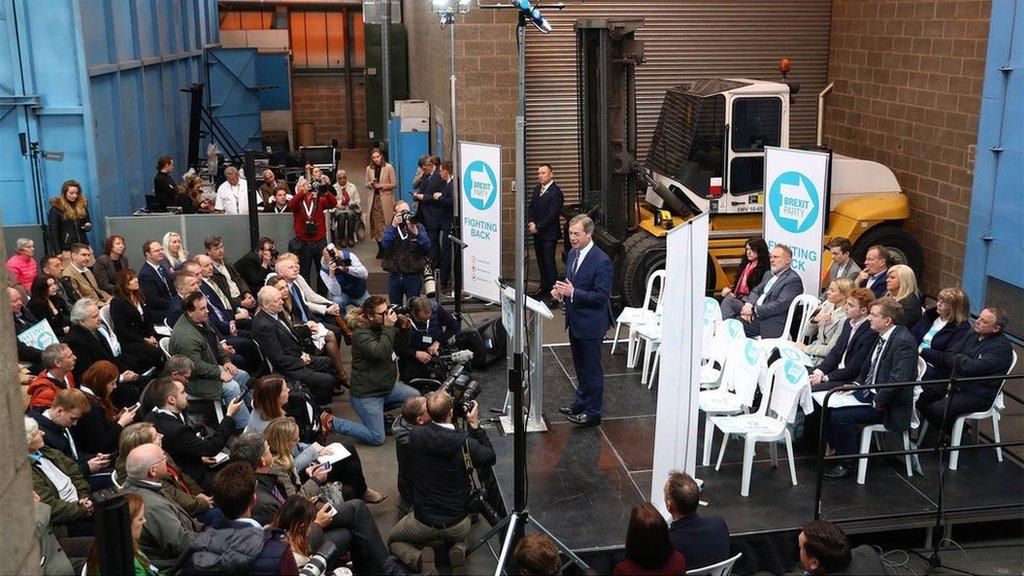
Nigel Farage speaks at the launch of the Brexit Party, Coventry, 2019
And, incidentally, his decision to abandon UKIP and set up an entirely new organisation gave the lie to his claims that it was not a one-man band. The "left behind" voters he had won for UKIP followed him, and his former party imploded in his wake.
But is his magic fading? In 2015 UKIP attracted four million votes. But for this, they only got one MP - and it wasn't N Farage. In this election, insurgency has been harder. Brexit is the policy of the Conservative government, and that forces Farage into more nuanced arguments about its version of Brexit as opposed to his. At those election rallies he sounded much more comfortable bashing Remainers.
Then there was his decision not to contest a Commons seat himself. Having failed to win the election in Eastleigh in 1994, Salisbury (1997), Bexhill and Battle (2001), South Thanet (2005 - his first attempt at the seat), Buckingham (2010) and finally South Thanet again in 2015, John Woodcock wonders if there might be a kind of glass ceiling to his appeal. "It's interesting that someone with his star quality can't get elected, it gives me some solace about the instincts of the voters."
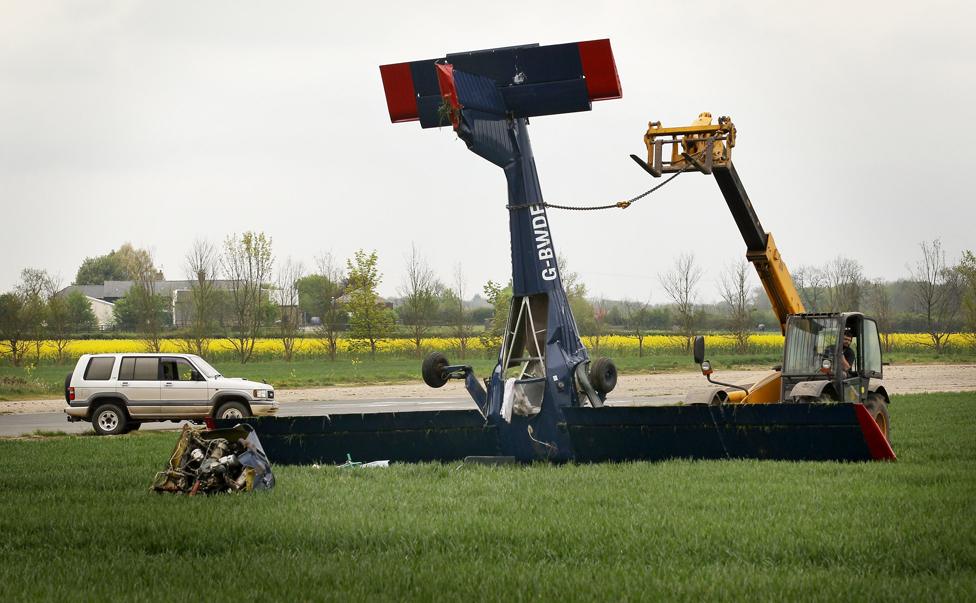
A plane carrying Nigel Farage crashed on the day of the 2010 general election when its UKIP-promoting banner became entangled in the tail fin
In fairness, the other parties threw everything into their efforts to prevent Farage reaching Parliament in 2015, not least because he had pledged to resign as leader if he was not elected. His defeat was bruising and dispiriting, and he would have faced the same problems of fighting an intense constituency battle while also leading a national campaign, wherever he might have run this time.
Another factor is that, until now, he has faced Conservative leaders who couldn't match his appeal to those Brexity, working-class and traditional Tory voters. John Major wanted to be at the heart of Europe, William Hague, Iain Duncan Smith and Michael Howard did toy with Farage-esque populism, but didn't convince. David Cameron was a liberal centrist, and Theresa May's initial "Iron Lady" appeal corroded rapidly.
But Boris Johnson is a direct rival for the hearts and minds Farage had claimed as his own. "Farage will say he thinks Johnson and Johnsonism are over-rated, but the reality is that he's now up against a charismatic politician who can match him," says one long-standing Brexit campaigner.
An early sign was Farage's inability to pin the blame for the postponement of Brexit on the prime minister - part of the reason for that was that there wasn't a group of hard Brexit Conservative MPs willing to attack the government's new-look Brexit deal as BRINO (Brexit in Name Only).
There's a parasitical co-dependent relationship between the Brexiteer Tory right and Farage. He does best when they're crying betrayal and amplifying his message to Conservative voters, that they've been let down by their leaders, once again.
Final exit?
What next? Will he be able to revive the Brexit Party if there is no Brexit or an unsatisfactory Brexit? His decision to stand down Brexit Party candidates in Conservative seats infuriated some of his supporters, and provoked open rebellion among a few.
It may be hard to get the band back together again. Despite his confident exterior, this is the first time Farage has found himself on the defensive, but he continues to insist that the Brexit Party is needed, although after the UK leaves, it might need to be re-branded. And John Woodcock is struck by the "remarkable" way the UKIP/Brexit Party electoral coalition has on occasion "collapsed in on itself" and then re-assembled, particularly for mid-term elections like those for the European Parliament.
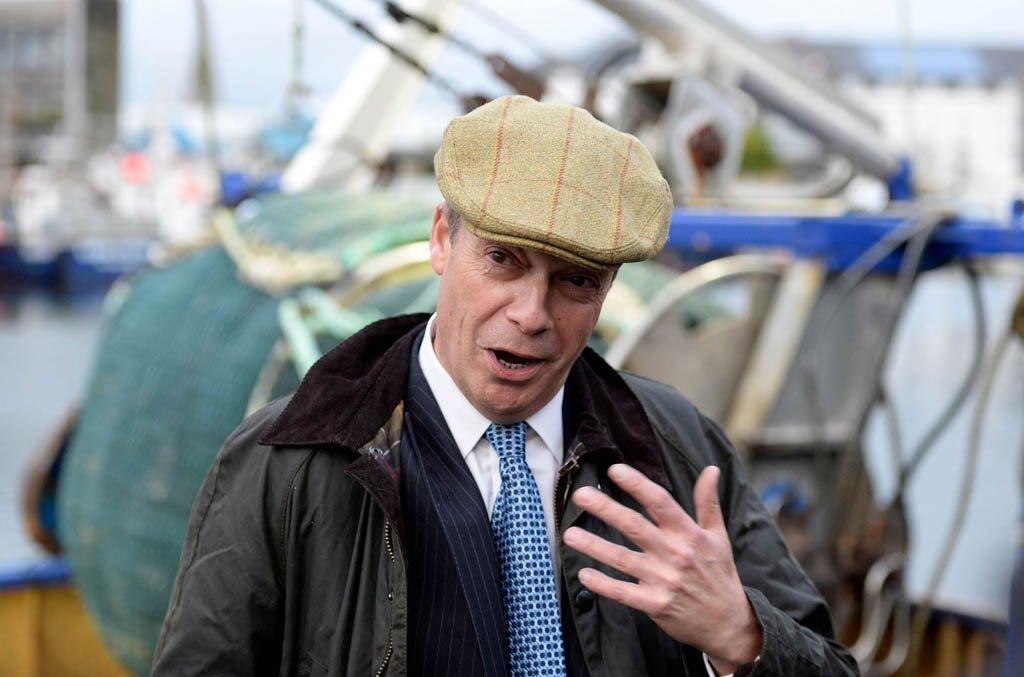
Nigel Farage campaigning in Plymouth, 2019
But before that, there's a general election. And even if the Brexit Party fails to gain a single seat, its intervention (or non-intervention) could tip the balance in hundreds of constituencies. Might an over-enthusiastic campaign actually prevent a Tory victory, lead on to a hung parliament and then to a second referendum?
Farage's sense of ownership of Brexit is deeply, deeply personal, and makes it hard to let go, and stand aside to allow Boris Johnson to deliver it. So could the man who spent 30 years in the wilderness arguing for Brexit ultimately be the man who stops it happening altogether? The question is whether he knows when to stop, or is even capable of stopping.
There are, Farage-watchers say, two Nigels: Nice Nigel and Nasty Nigel. They reflect the fun, patriotic, Del Boy side of populism, and its angrier flipside - in other words, the charismatic, optimistic, Happy Warrior or the angry populist Dark Knight. And this election could still turn on which one emerges in this campaign.
All photos subject to copyright